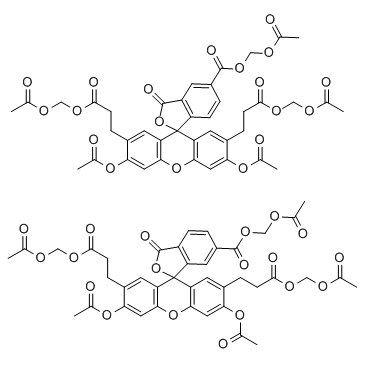Oxidative stress reduces Na+/H+ exchange (NHE) activity in a biliary epithelial cancer cell line (Mz-Cha-1).
Christoph Elsing, Agnieszka Voss, Thomas Herrmann, Iris Kaiser, Chrisitan A Huebner, Thorsten Schlenker
Index: Anticancer Res. 31(2) , 459-65, (2011)
Full Text: HTML
Abstract
In cholangiocarcinogenesis, chronic inflammation and oxidative stress play a key role. The Na(+)/H(+) exchanger (NHE) forms a potential link between control of intra- and pericellular pH and tumor development. Therefore, the effects of oxidant stress were determined by the use of tert-butyl hydroperoxide (t-BOOH) on Na(+)/H(+) exchange in a biliary epithelial cancer cell line (Mz-Cha-1). The cells were exposed to the hydroperoxide and the rate of recovery from acidosis was determined by the use of the pH-sensitive fluorochrome 2',7'-bis(carboxyethyl)-5(6)-carboxyfluorescein acetoxymethyl ester (BCECF/AM). t-BOOH reduced Na(+)/H(+) exchange activity in a dose-dependent manner. At 4 mM t-BOOH, Na(+)/H(+) exchange activity was virtually absent. This was accompanied by an increase in cytotoxicity (MTT assay). Glutathione repletion and intracellular Ca(++) chelation partially restored the Na(+)/H(+) exchange activity. Hydroperoxide seemed neither to alter the intracellular signal transduction pathways (cAMP and Ca(++) oscillations) nor the membrane distribution of the exchanger (immunostaining). Decrease in Na(+)/H(+) exchange activity in this model of oxidant stress may represent an early perturbation of membrane function, and the functional integrity of Na(+)/H(+) exchange could therefore be dependent on the glutathione redox system.
Related Compounds
| Structure | Name/CAS No. | Molecular Formula | Articles |
|---|---|---|---|
 |
BCECF-AM
CAS:117464-70-7 |
C40H36O19 |
|
Fast loading ester fluorescent Ca2+ and pH indicators into p...
2012-01-01 [J. Plant Res. 125(1) , 185-95, (2012)] |
|
Role of the plasma membrane calcium adenosine triphosphatase...
2006-08-01 [J. Neurosci. Res. 84(2) , 326-37, (2006)] |
|
Platelet-activating factor stimulates cytoplasmic alkaliniza...
2004-11-15 [J. Cell Sci. 117(Pt 24) , 5749-57, (2004)] |
|
Freeze-dried rehydrated human blood platelets regulate intra...
2006-06-01 [Transfusion 46(6) , 1029-37, (2006)] |
|
Activity and expression of Na+/H+ exchanger isoforms in the ...
2005-05-01 [Pflugers Arch. 450(2) , 123-30, (2005)] |